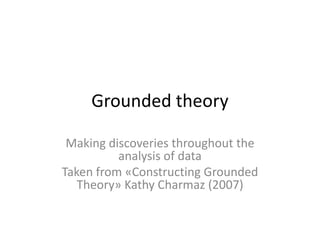
Grounded theory: Making discoveries throughout the analysis of data
- 1. Grounded theory Making discoveries throughout the analysis of data Taken from «Constructing Grounded Theory» Kathy Charmaz (2007)
- 2. What is true about GT? • It requires us to ask analytic questions • You start this process as soon as you finish collecting data • GT is a systematic methodology that involves the generation of theory from data • In GT you, first, code the data; then, you group the information into concepts and finally, theory emerge.
- 3. Research Methodology A systematic & To build theory rigorous process Ethonography & case Give credibility and studies reliability Simoultaneous data collection and analysis
- 4. It is synthesizing hundreds of pages of int, Fn, doc to develop grounded theory. Grounded Theory Is the constant Analysis of the Data. Consist of 4 stages • Compare incidents (tentive catg) • Comparing Changes (integrating) • DelImitation of the theory (reducing similar) • Forming Systematic substative theory (reasonable accurate statement
- 5. PHASES Concepts Theory • Initial • Formed • Focused • Grouping out of • Findings codes concepts Coding Categories
- 6. Coding • Naming segments of data to categorize, summarize and account for data • Generates the bones of your analysis • Basis to build the analysis • Make your codes fit your data rather than forcing your data to fit them
- 7. TIPS FOR CODING • Remain open • Stay close to the data • Keep your codes simple and precise • Construct short codes • Preserve actions • Compare data with data • Move quickly through the data
- 8. Cycles in coding • Naming words, lines, segments, incidents Initial • Provisional • Identify gaps in data collection • In Vivo codes • Use of frequent codes to sort, synthesize, integrate and organize Focused data • Comparing data from different methods
- 9. Coding for what is happening Identifying a So part of it has been good because positive I can see that I'm not the only one Recognizing other that has good days and bad days, people’s good everybody does. and bad days Qualifying their good They might not be physical, as and bad days much as psychological, but Viewing good and everybody has kind of good days bad days as and bad days, as moods and things universal too.
- 10. Initial coding practices Word by word Line by line Incident by incident
- 11. Which questions do grounded theorists use when coding data? • What is happening? (Glaser, 1978) • What theoretical category does this datum indicate? (Glaser, 1978) • What does the data suggest? Pronounce? • From whose point of view?
- 12. CODING AND CATEGORIES in the diagnostic stage CODING CATEGORIES Lack of listening SKILLS Oral production reading & writing SKILLS Ss attendance ATTITUDE Relationship ATTITUDE Improve my teaching STRATEGIES Learning strategies & writing STRATEGIES Mistakes GRAMMAR Lack of grammar GRAMMAR verb agreement GRAMMAR Use of the language COMPETENCES Use of the language COMPETENCES
- 13. Categories and codes for the implementation stage sub categories Teachers’ perceptions about how students view of English class ss feelings with each other and the teacher Rapport Negative Reaction about the lack of motivation language ss negative reactions to the language lack of commitment led to bad performance commitment ss' commitment caused good results Teachers' desire for improvement teachers' desire for self-improvement improvement teachers' desire to improve their classes reflect on becoming updated Reflect Teachers reflecting about ss' needs reflect on ss' profile teachers' development of autonomy in ss development Teachers 'strategies to improve ss weaknesses strategies Teachers' perspectives about course orientations teachers focused on specific skill (s) Skills teacher had communicative focus communication teachers' perspectives about the course Teachers´ objectives do not match course objectives
- 14. INTERPRETATION GRAMMAR It refers to the order of the words within a sentence. Teachers mentioned that students needed to improve in accuracy SAMPLE K EQ2 Students had some mistakes during the activities in written exercises C EQ3 Ss present problems when working with Passive/clauses/P. perfect C EQ2 They had terrible bases. No grammar, nothing INTERTREPATION The data suggest that teachers are still focusing on grammar and the importance of accuracy when teaching or using a skill. Teachers never mentioned that due to the fact that learners showed problems with grammar that they were not able to convey feeling or thoughts. However, this comes to show us that teachers are still not aware that the Institution implements the communicative approach.
- 15. Naming(codin g) Grouping Finding Relationship Displaying or categorizing
- 16. Problems while coding • Coding at too general a level • Identifying topics instead of actions and processes • Overlooking how people construct actions • Attending to disciplinary or personal rather than participants’ concerns • Coding out of context • Using codes to summarize not to analyze
